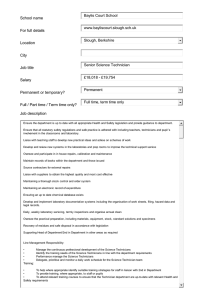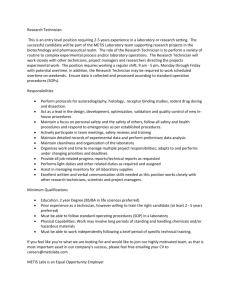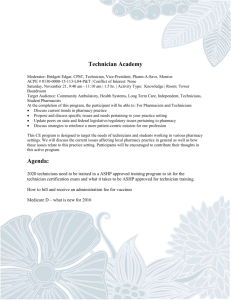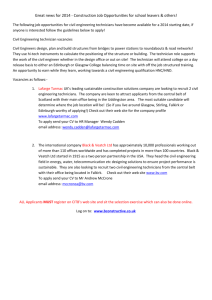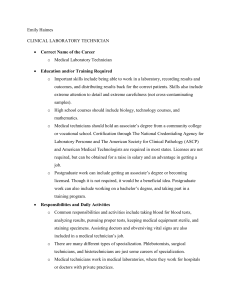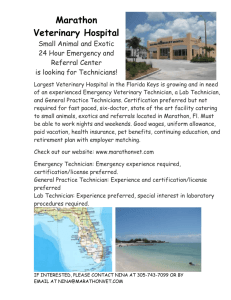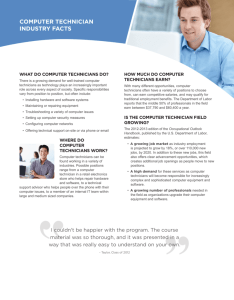Engineering Technology Advisory Meeting, September 23, 2015
advertisement
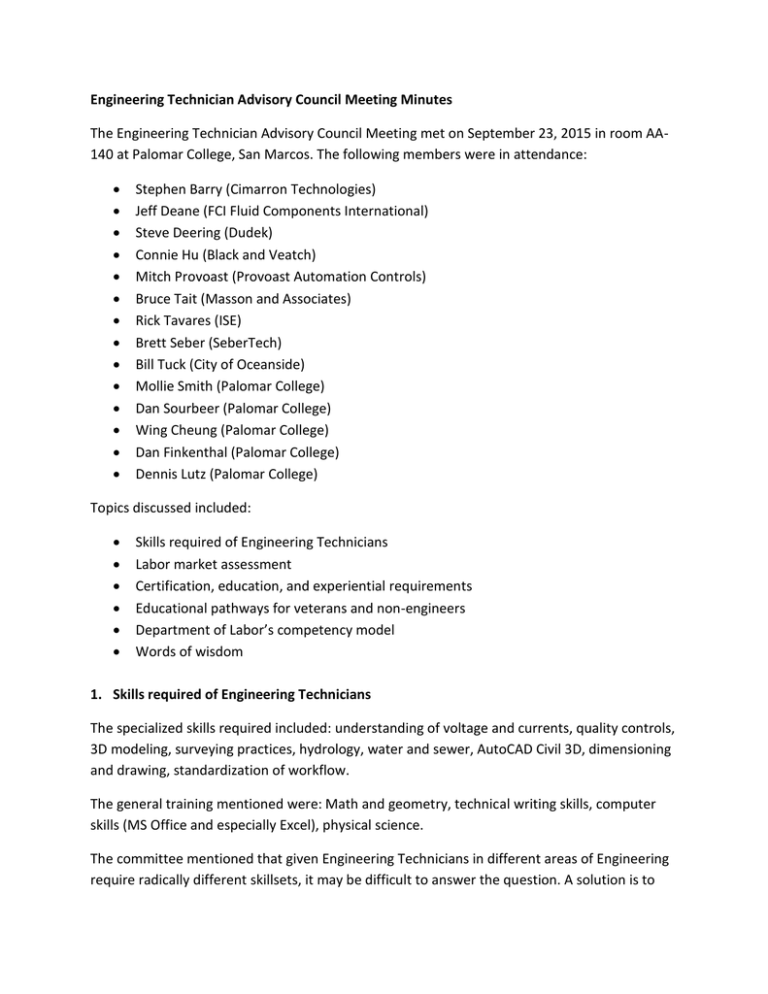
Engineering Technician Advisory Council Meeting Minutes The Engineering Technician Advisory Council Meeting met on September 23, 2015 in room AA140 at Palomar College, San Marcos. The following members were in attendance: Stephen Barry (Cimarron Technologies) Jeff Deane (FCI Fluid Components International) Steve Deering (Dudek) Connie Hu (Black and Veatch) Mitch Provoast (Provoast Automation Controls) Bruce Tait (Masson and Associates) Rick Tavares (ISE) Brett Seber (SeberTech) Bill Tuck (City of Oceanside) Mollie Smith (Palomar College) Dan Sourbeer (Palomar College) Wing Cheung (Palomar College) Dan Finkenthal (Palomar College) Dennis Lutz (Palomar College) Topics discussed included: Skills required of Engineering Technicians Labor market assessment Certification, education, and experiential requirements Educational pathways for veterans and non-engineers Department of Labor’s competency model Words of wisdom 1. Skills required of Engineering Technicians The specialized skills required included: understanding of voltage and currents, quality controls, 3D modeling, surveying practices, hydrology, water and sewer, AutoCAD Civil 3D, dimensioning and drawing, standardization of workflow. The general training mentioned were: Math and geometry, technical writing skills, computer skills (MS Office and especially Excel), physical science. The committee mentioned that given Engineering Technicians in different areas of Engineering require radically different skillsets, it may be difficult to answer the question. A solution is to develop a generic core engineering preparation curriculum that will be taken by students in Year 1 of an Associate’s Program, and to have the students focus on practical applications and specialized training for a chosen field of Engineering (e.g. Civil Engineering, Electrical Engineering) in Year 2. The generic core curriculum should cover the general training mentioned above, and may prepare students for internship or assembly line positions. By combining their internship experience with their Year 2 specialized skills training, students can attain positions as entry level designers after obtaining their Associate’s Degree in Engineering Technologies, but will need Bachelor’s Degree in Engineering in order to move into management positions. Another potential career trajectory for Engineering Technician graduates is to attain their EIT certificate by passing the exam post-graduation. The committee is fully aware that the curriculum for the Associate’s Program in Engineering Technician (with the goal of preparing graduates for the job market) will be different from the curriculum for the Associate’s Program in Engineering (with the goal of preparing graduates for transfer to 4 year institutions). The committee commented that the Labor Market Report produced by the Chancellor’s office documenting top skills and job titles mentioned in engineering-related job posts seem to be slanted towards Electrical and Mechanical Engineering, while skills (e.g. AutoCAD Civil 3D) and titles (Designers) related to Civil Engineering seem to be missing. 2. Labor market assessment There is overwhelming agreement among all members that there is a need for more Engineering Technicians. The demand arises from the governmental sector (local governments) as well as the private sector. The demand from the governmental sector is driven by aging infrastructure (e.g. waterlines) and water management (e.g. storm water plan, desalination, water recycling). The demand from the private sector is driven by the rise and return of manufacturing activities to the U.S. Generally, all members agreed that the increase in work is creating a need for Engineering Technicians. There may also be new vacancies as existing Engineering Technicians leave their current positions in order to reduce their commute time. Engineering Technician jobs can be found in the North County region along the 78 corridor. As an example, Jeff from Fluid Components mentioned that they hire 2 workers a month for the assembly line, and 1 worker a year for their Electronics Technician position. 3. Certification, education, and experiential requirements In terms of formal education, participants are asked about Math, English, and Computer skills required of an Engineering Technician. MATH: 5 of 8 respondents answered Trigonometry, and 3 of 8 respondents answered Precalculus. None selected College Algebra, Calculus I or Calculus II. Trigonometry was chosen because respondents believed that technicians need to understand spatial relationships and 3D, and pre-calculus was chosen because technicians should have an understanding of limits and log-functions. College Algebra 3 Trigonometry Pre-Calculus Calculus I 5 Calculus II ENGLISH: 8 of 8 respondents said that a technical reading and writing class should be required for engineering technology students who have completed a basic level college English class. 0 Tech Writing Required Tech Writing Not Required 8 COMPUTER: 3 of 8 answered basic programming (MATLAB, Python), 2 of 8 answered CAD, 3 of 8 answered both CAD and basic programming. It was noted that electrical engineers tend to write programs, thus the need to learn C programming. Civil engineers tend to use programs but not write them, thus the need to learn software like AutoCAD Civil 3D. Those who selected both believed that the more computer skills that graduates know, the better. 00 Basic programming 3 3 CAD Both Other 2 Computer skills not required 1 of respondents answered that a high school diploma is sufficient. 5 of 6 respondents answered that an Associate’s degree is the minimum academic qualification for an engineering technician position at their organization. Generally, associate’s degree holder will enter the organization as a field technician with opportunities for advancement. Some council members said that their organizations will hire on associate’s degree holder, but will offer them tuition reimbursement in order to encourage them to pursue bachelor’s degrees, which is needed for management positions. 1 member noted that DUDEK generally hires students who are currently working towards their bachelor’s degree and are in their 3rd or 4th year of university. The only exception being a candidate with an associate’s degree with substantial professional experience. 1 Bachelor's degree Associate's degree Post-Secondary certificate High school diploma 5 In terms of professional certification, it was pointed out that EIT will be the terminal certification for Engineering Technicians. However, councilmembers noted that EITs may be eligible for the PE test after 20 years of experience. Moreover, it was noted that professional certification in ancillary fields such as land surveying, water-wastewater technology, inspection, soil technician may be advantageous for engineering technicians. Students interested in pursuing advanced careers in Engineering (past the Engineering Technician level) should also be encouraged to get involved with student organizations. In terms of experience, all respondents highly value internships and count them as a vital part of a candidate’s professional experience (with the exception of the City of Oceanside). Some respondents noted that they will hire on high school students or 2-year college students as interns. Specifically, Jeff from Fluid Components International remarked that his organization hires interns for the summer term (generally taking in 4-8 of 12 applicants) with the potential of promoting interns to full time positions. In our survey of whether their organizations currently provide paid internships, 4 of 8 respondents said they provide paid internships to students, 1 respondents said they mostly have unpaid internships, and 3 said they don’t at the time, but may consider it in the future. The members who voted they “may consider it” responded that the decision hinges on timing (e.g. currently in the process of rebuilding manufacturing capacity) and the employers’ ability to secure business contracts. We offer paid internships We offer unpaid internships 3 4 We don't offer internships We may offer internships in the future I don't know 1 4. Educational pathways for veterans and non-engineers VETERANS: There is overwhelming consensus that no special hiring preference is given to veterans, but their experience in the military will be considered in the interview process, but is not considered equivalent to experience in the engineering field (unless their tasks in the military is engineering related). Specifically, the instrumentation skill attained by veterans in the military may be transferrable to the civilian workplace. Moreover, veterans may have an understanding of specialized military and defense vocabulary that is an asset to the sales of products to defense-related businesses. Aside from training in technical skillsets within an associate’s program, veterans may be well served by training in “soft skills” (e.g. teamwork) in order to help them fit in with the company’s culture. NON-ENGINEERS: As for over-educated, underemployed graduates with non-engineering degrees, the council advised that Palomar College can best serve those students with coursework on specific skillset and technical training. 5. Department of Labor’s competency model The council remarked that the DOL’s competency model is very thorough. They specified that for the purpose of an Engineering Technician program, Palomar needs to focus on Tier 2 in the Year 1 core curriculum, and focus on Tier 3 with an awareness of Tier 4 competencies in the Year 2 specialized curriculum. Specifically, it was suggested that Tier 4 competencies such as Professional Ethics, Public Policy, and Engineering Economics are extremely important, and should be embedded in an Introduction to Engineering survey course or the Technical Writing course. 6. Words of wisdom for aspiring Engineering Technicians: Always try to progress with education and don’t get complacent. I would recommend taking courses and developing strong foundation in math, physics, chemistry, basic computer skills, surveying, materials, structural design, basic electronics/electrical. Be truly interested in your field; don’t stop thinking at 5 o’clock. Ask questions until you have absolute clarification. Become extremely proficient in mathematics. Learn as much as possible about math, geometric principles, and good written communication and drafting presentation skills. Be open to learn everything and help everyone in the company offers to build up more value for yourself in the company. Word cloud analysis shows that Basic Math is important. The responses indicated that students should try to learn as much as they can, but it is accepted that they won’t learn everything. So they should always strive to continue learning and should not be afraid to ask questions.
